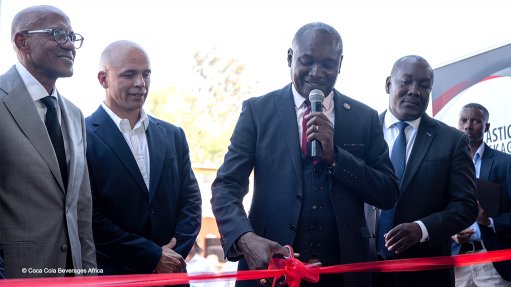Should we worry about Chinese generosity?
Back in March, former US Secretary of State Rex Tillerson became the umpteenth Western big gun to urge Africans to beware of Chinese generosity on the continent, which has taken the form of freebies such as the African Union headquarters in Addis Abba, Ethiopia – built at a cost of $200-million in 2012 – and massive investments in infrastructure like roads, railways and ports.
Tillerson offered this unsolicited advice only days before he was fired by tweet by President Donald Trump, with whom he had repeatedly clashed on foreign policy. The ‘advice’ carried distinct neo-colonial undertones: the billions that the Chinese are pumping into the continent come with dependence, exploitation and intrusion into countries’ sovereignty.
Last month, one of our own, famed Kenyan lawyer and intellectual Patrick Lumumba, added his voice to the chorus of warnings about increasing Chinese involvement in Africa when he delivered the Nelson Mandela Memorial Lecture at Walter Sisulu University’s Mthatha campus, in the Eastern Cape.
I thought about all this when Chinese President Xi Jinping was in town late last month to attend the tenth summit of the five-country bloc of Brazil, Russia, India, China and South Africa – popularly known as Brics. Before the big jamboree kicked off in Johannesburg, he and his host, President Cyril Ramaphosa, made the time to officially unveil – via live video link – the first phase of Beijing Automotive Group Corporation’s (BAIC’s) 65%-owned car plant at the Coega industrial development zone, near Port Elizabeth. Initial production will comprise 50 000 passenger cars, multipurpose and sports utility vehicles, and bakkies, but this number will increase twofold should BAIC and its joint venture partner, South Africa’s Industrial Development Corporation, proceed with plans to roll out a second phase of the project.
Xi’s presummit itinerary also included a bilateral engagement with the South African government, during which State-owned electricity utility Eskom – which the Guptas nearly succeeded in hollowing out as their State capture project went into overdrive – signed a R33.4-billion loan agreement with the China Development Bank, with the funds to be used for the construction of the Kusile power station, in Mpumalanga. Xi also pledged investment totalling $14.7-billion in several sectors of the South African economy.
It may be easy to dismiss Tillerson’s exhortation to beware of loads of Chinese lucre flowing into Africa as being motivated by rivalry between China and the US, but is it really without merit? I know I am not an economist and should perhaps be sticking to my knitting – which is reporting facts – but I firmly believe there is at least a modicum of validity in what he and others are saying. Their message, in short, is that friendship with China comes with economic booby traps.
As one political commentator has so beautifully put it, when they extend loans to countries, the Chinese have a tendency to regard these as strings they will be all too ready to pull when the behaviour of the beneficiary country begins to fall out of alignment with their expectations.
Others have stated that most of the infrastructure deals that the Chinese finance include a stipulation that workers be brought from their home country – which is not such a brilliant idea, considering the serious unemployment problem on the continent, especially among the youth. And they have also been accused of disregarding anti-bribery laws, which conceivably fuels corruption on our continent.
Another concern is that China comes across as an unforgiving lender when the beneficiaries of the infrastructure projects it finances run into financial difficulties and default on debt repayment. Only in December last year, it forced Sri Lanka to hand over the strategic port of Hambantota – valued at $1.1-billion – to its State-owned companies over Sri Lanka’s failure to service debt amounting to $8-billion. I would not want to wake up one morning and be told that the Kusile power station is now in Chinese hands because Eskom has failed to repay the billions it owes them. This is a very distant possibility, I know – but a possibility all the same.
Comments
Announcements
What's On
Subscribe to improve your user experience...
Option 1 (equivalent of R125 a month):
Receive a weekly copy of Creamer Media's Engineering News & Mining Weekly magazine
(print copy for those in South Africa and e-magazine for those outside of South Africa)
Receive daily email newsletters
Access to full search results
Access archive of magazine back copies
Access to Projects in Progress
Access to ONE Research Report of your choice in PDF format
Option 2 (equivalent of R375 a month):
All benefits from Option 1
PLUS
Access to Creamer Media's Research Channel Africa for ALL Research Reports, in PDF format, on various industrial and mining sectors
including Electricity; Water; Energy Transition; Hydrogen; Roads, Rail and Ports; Coal; Gold; Platinum; Battery Metals; etc.
Already a subscriber?
Forgotten your password?
Receive weekly copy of Creamer Media's Engineering News & Mining Weekly magazine (print copy for those in South Africa and e-magazine for those outside of South Africa)
➕
Recieve daily email newsletters
➕
Access to full search results
➕
Access archive of magazine back copies
➕
Access to Projects in Progress
➕
Access to ONE Research Report of your choice in PDF format
RESEARCH CHANNEL AFRICA
R4500 (equivalent of R375 a month)
SUBSCRIBEAll benefits from Option 1
➕
Access to Creamer Media's Research Channel Africa for ALL Research Reports on various industrial and mining sectors, in PDF format, including on:
Electricity
➕
Water
➕
Energy Transition
➕
Hydrogen
➕
Roads, Rail and Ports
➕
Coal
➕
Gold
➕
Platinum
➕
Battery Metals
➕
etc.
Receive all benefits from Option 1 or Option 2 delivered to numerous people at your company
➕
Multiple User names and Passwords for simultaneous log-ins
➕
Intranet integration access to all in your organisation


















